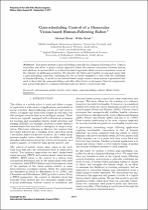JavaScript is disabled for your browser. Some features of this site may not work without it.
- ResearchSpace
- →
- Research Publications/Outputs
- →
- Conference Publications
- →
- View Item
| dc.contributor.author |
Burke, Michael G

|
|
| dc.contributor.author |
Brink, W

|
|
| dc.date.accessioned | 2011-10-10T12:15:45Z | |
| dc.date.available | 2011-10-10T12:15:45Z | |
| dc.date.issued | 2011-08 | |
| dc.identifier.citation | Burke, M.G. and Brink, W. 2011. Gain-scheduling control of a monocular vision-based human-following robot. 18th World Congress of the International Federation of Automatic Control (IFAC 2011), Università Cattolica del Sacro Cuore Milano, Italy, 28 August-2 September 2011 | en_US |
| dc.identifier.uri | http://hdl.handle.net/10204/5216 | |
| dc.description | 18th World Congress of the International Federation of Automatic Control (IFAC 2011), Università Cattolica del Sacro Cuore Milano, Italy, 28 August-2 September 2011 | en_US |
| dc.description.abstract | This paper presents a gain-scheduling controller for a human-following robot. Typical controllers use either a point-to-point approach where the relative orientation between human and platform is uncontrolled, or a direction-based approach which corrects orientation errors at the expense of additional actuation. The authors describe the flaws and benefits of each and argue that a gain-scheduling controller combining the two is better equipped to deal with the challenges of human-following. A model of our feature-based, single camera vision system is presented and used to show that the gain-scheduling controller offers better performance than its components, and actual responses to a human following task are used to corroborate this. | en_US |
| dc.language.iso | en | en_US |
| dc.relation.ispartofseries | Workflow request;7230 | |
| dc.subject | Autonomous mobile robots | en_US |
| dc.subject | Robot vision | en_US |
| dc.subject | Gain scheduling control | en_US |
| dc.subject | Monte Carlo simulation | en_US |
| dc.subject | Human following robot | en_US |
| dc.title | Gain-scheduling control of a monocular vision-based human-following robot | en_US |
| dc.type | Conference Presentation | en_US |
| dc.identifier.apacitation | Burke, M. G., & Brink, W. (2011). Gain-scheduling control of a monocular vision-based human-following robot. http://hdl.handle.net/10204/5216 | en_ZA |
| dc.identifier.chicagocitation | Burke, Michael G, and W Brink. "Gain-scheduling control of a monocular vision-based human-following robot." (2011): http://hdl.handle.net/10204/5216 | en_ZA |
| dc.identifier.vancouvercitation | Burke MG, Brink W, Gain-scheduling control of a monocular vision-based human-following robot; 2011. http://hdl.handle.net/10204/5216 . | en_ZA |
| dc.identifier.ris | TY - Conference Presentation AU - Burke, Michael G AU - Brink, W AB - This paper presents a gain-scheduling controller for a human-following robot. Typical controllers use either a point-to-point approach where the relative orientation between human and platform is uncontrolled, or a direction-based approach which corrects orientation errors at the expense of additional actuation. The authors describe the flaws and benefits of each and argue that a gain-scheduling controller combining the two is better equipped to deal with the challenges of human-following. A model of our feature-based, single camera vision system is presented and used to show that the gain-scheduling controller offers better performance than its components, and actual responses to a human following task are used to corroborate this. DA - 2011-08 DB - ResearchSpace DP - CSIR KW - Autonomous mobile robots KW - Robot vision KW - Gain scheduling control KW - Monte Carlo simulation KW - Human following robot LK - https://researchspace.csir.co.za PY - 2011 T1 - Gain-scheduling control of a monocular vision-based human-following robot TI - Gain-scheduling control of a monocular vision-based human-following robot UR - http://hdl.handle.net/10204/5216 ER - | en_ZA |






